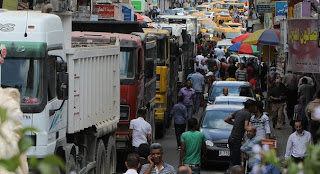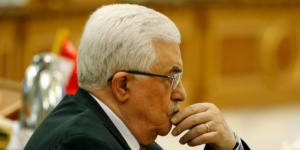[AS
ALWAYS
PLEASE GO TO THE LINK
TO READ GOOD ARTICLES IN
FULL: HELP SHAPE ALGORITHMS (and
conversations) THAT EMPOWER
DECENCY, DIGNITY, JUSTICE &
PEACE... and hopefully Palestine]
Article
October 15, 2012
Early last month, thousands of Palestinians across the Israeli-occupied West Bank took to the streets to protest the rising cost of living, voice their anger over unpaid government salaries and the imposition of tax and fuel price hikes (later revoked under public pressure), and call for the resignation of Palestinian prime minister Salam Fayyad. Two weeks later, on September 23, in a meeting of donor countries held in New York City, the World Bank, the International Monetary Fund (IMF), and the United Nations reported their grim assessment of the Palestinian fiscal situation, warning of harsher times ahead and urging donors to provide the Palestinian Authority (PA) with $400 million urgently needed to bridge its funding gap for the rest of this year. Failure to act, they argued, would make things far worse and have grave political and social repercussions.
The severity of the Palestinian financial crisis was evident this summer when the cash-strapped PA struggled, for three months in a row, to pay its 150,000-plus employees their full salaries on time. It was only able to meet its obligations after receiving a $100 million grant in July from Saudi Arabia, and, in July and in September, a total of $110 million from Israel as advance payments on future monthly transfers of customs taxes that Israel collects on behalf of the PA in accordance with the 1994 economic protocol.
This fiscal crisis began in 2011, when domestic revenues, customs tax transfers from Israel, and international financial support all turned out to be lower than planned in the budget. This resulted in a higher recurrent deficit (13 percent of GDP), forcing the PA to bridge the funding gap by borrowing from domestic banks, accumulating arrears to the private sector, and continually failing to contribute the government's share of the already-insolvent public pension fund. By the end of 2011, the PA's debt to commercial banks had reached $1.1 billion, with arrears to domestic suppliers amounting to $530 million, and an estimated $1.5 billion of accumulated debt to the public pension system.
The PA's financial troubles continued into 2012. The year started with a projected recurrent deficit of $1.1 billion, coupled with low prospects for both economic growth and donor assistance. More specifically, growth in 2012, and in sharp contrast to the impressive 9 percent annual average rate between 2008 and 2010, was forecast at 5 percent, the same as in 2011. Likewise, foreign budgetary support, though still high at an annual average of $1.27 billion over the last four years, was on a declining trajectory, reaching $814 million in 2011, down from $1.76 billion in 2008.
As 2012 progressed, so did the PA's financial misfortune. By midyear, the PA's public expenditure had climbed 4.5 percent higher than planned, gross revenues were 7 percent lower than budgeted, and the flow of donor funding was in decline. This led the PA again to turn to commercial banks and the private sector, asking for cash and credit to help finance an expanding recurrent deficit. With the PA already owing $1.7 billion to these parties, they were not in a position to extend more funds. Nor was the Palestinian public in the West Bank willing to put up with a higher cost of living when the PA raised taxes and fuel prices early last month.
What makes the PA's current financial quandary even more serious is the fact that it has very few policy options to get itself out of the woods. Over the past four years the PA has implemented a host of reform measures principally designed to put its fiscal house in order. In the process, PA expenditure was streamlined and domestic revenues increased, mainly through improving tax administration and collection. As a result, the PA's recurrent deficit was brought down from 21 percent of GDP in 2008 to 13 percent of GDP in 2011. This policy of fiscal consolidation, successful and controversial as it has been, seems to have reached its limit now, and can only be pushed further at a high political and social cost, as recent public unrest in the occupied West Bank has vividly demonstrated.
While necessary, the preceding technical explanation of the PA's financial crisis—which considers the crisis through the prism of changes in revenues, expenditures, and foreign assistance levels—is grossly insufficient to fully understand the true nature of the PA's current fiscal predicament. To do that, one needs to look beyond the raw statistics and examine the political-economy aspect of the crisis. Through this lens, one would find a territorially-fragmented Palestinian Authority that operates under a prolonged colonial and military occupation that imposes all sorts of physical and administrative constraints on Palestinian economic activities, on access to markets and natural resources, and on the private sector's ability to plan, invest and grow over the long term.
In this extremely limiting setting, the chances of productive and sustained economic growth along with the capacity to generate enough domestic revenues to finance public expenditure are undermined. What's more, it is highly unlikely that foreign aid will have a lasting positive impact. Only in this sui generis context can one understand why, among other things, the PA—which received close to $6 billion in international budgetary and development support between 2008 and 2011—is currently experiencing such a severe financial crunch.
What can be done to solve this crisis? In the immediate to short term, donor funds are desperately needed and, politics aside, may be forthcoming. The United States is currently contemplating the release of some $200 million to the PA. The European Union is also considering granting the PA an extra 100 million euros. Israel has already made two advance payments of PA customs duties and may do so again in the near future. But this likely flow of much-needed funds, crucial as it is for the PA’s immediate financial survival, does not address the fundamental underlying causes of the PA's twenty-month-old financial predicament. Nor will the pressure on the PA to adopt more austerity-type measures, outlined in the IMF’s latest report on the Palestinian economy, be without risks.
In the long term, the only cure for the PA's recurrent budget deficit would be sustained, productive growth led by the private sector—not one bankrolled by massive foreign aid in a highly constrained and heavily distorted setting—that creates real jobs, increases per capita income, broadens the tax base, and provides the PA with more domestic revenues to finance its activities. In today’s occupied West Bank, the possibility of such growth taking place is virtually nil.
With the space for PA policy action vastly narrowing, the Palestinian public's patience growing thin, the stock of PA domestic debt piling up, donor financial support declining, and Israel's occupation and settlement policies in the West Bank showing no signs of abating, the prospects for a solution to the PA's financial crisis anytime soon are very slim. Indeed, unless drastic action is taken on the political front, the Palestinian Authority as it has existed since its establishment in 1994 could very well be on the verge of collapse.
Mohammed Samhouri (msamhouri@yahoo.com) is a senior economist at the Cairo-based Regional Center for Strategic Studies, a former senior fellow and lecturer at Brandeis University’s Crown Center for Middle East Studies in Boston, and a former senior economic adviser in the Palestinian Authority.
The Carnegie Endowment for International Peace
is a private, nonprofit organization dedicated to advancing cooperation
between nations and promoting active international engagement by the
United States. Founded in 1910, its work is nonpartisan and dedicated to achieving practical results.













